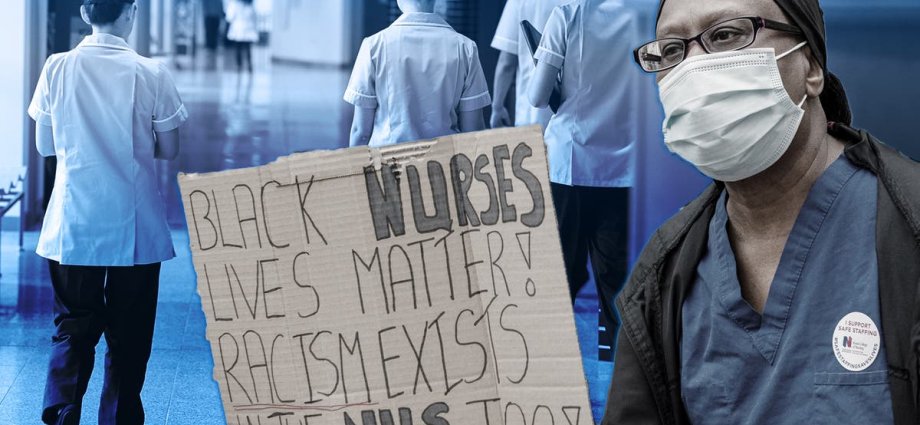Almost one in three temporary Black and minority ethnic staff have suffered physical violence, according to a leaked NHS review revealing “shocking” levels of racism in the health service.
Tens of thousands of NHS workers on zero hour contracts, also called bank staff, have faced “unacceptable” levels of racism, the report found.
According to a survey of workers by NHS England, 28 per cent of BME temporary personally experienced physical violence from patients, their relatives or the public. Compared to 23 per cent of white temporary workers.
The report, seen by The Independent, also revealed Black temporary staff are almost six times more likely to be disciplined by NHS employers compared to their white counterparts.
Experts have called on NHS employers to act on the “shocking” findings and protect temporary workers, who are currently treated as “second class” employees.
The news comes after NHS England said health services would take a zero tolerance approach to racism against their workers after a group Filipino nurses were targeted during the recent race riots.
Following the riots, Health Secretary Wes Streeting, affirmed calls for patients who direct racist abuse at staff to be turned away.
Last year, The Independent revealed levels of bullying and harassment of minority workers have not improved in the past five years with almost 30 per cent saying they have been targeted in the past year, compared to 20 per cent of white staff.
Issues of racism have also been uncovered by this publication within nurses regulator the Nursing and Midwifery Council after whistleblower allegations led to a review finding widespread racism within the NMC’s ranks.
Professor Habib Naqvi, chief executive, NHS Race and Health Observatory, said: “Urgent action is needed to tackle the unacceptable levels of racism, bias and discrimination at work experienced by Bank employees from Black, Asian and mixed ethnicity backgrounds. Of utmost concern, given these are often zero-hour contracts which do not offer bank employees with job security, is the high levels of discrimination these employees face from patients and colleagues alike.

“We know that an engaged and fully supported workforce leads to compassionate workplaces, organisational efficiencies and, critically, better outcomes for all patients. As the biggest employer of Black and ethnic minority staff in Europe, the NHS must implement evidence-based, anti-racism approaches that empower leadership and enhance data-driven accountability for tackling the root causes of these inequalities.”
The report which covers more than 171,000 temporary NHS workers also revealed:
- BME temporary workers were 1.4 times more likely to be formally dismissed compared to their white counterparts for conduct and capability
- Almost one third, 27 per cent, of BME workers experienced discrimination from patients compared to 7 per cent of white workers
- More than 36 per cent of BME staff reported experiencing harassment, bullying or abuse from patients compared to 31 per cent of white staff
Overall, temporary workers are more likely to experience discrimination compared to permeant NHS employees, according to the report.
Responding to the revelations UNISON head of health Helga Pile said: “Bank workers such as nurses, healthcare assistants and clerical staff are on worse pay and conditions, and treated less favourably than permanent NHS employees. Many take bank shifts to fit around their caring responsibilities. Sadly, many are forced to sacrifice job security for flexible working.
“A disproportionate number are black and face far worse treatment than white colleagues, as these shocking findings show. Action is needed to tackle all racial discrimination, bullying and harassment across the NHS.”
She also said trusts must answer for why so many staff are employed on a temporary basis.
“Exploitative bank contracts should become regular jobs with flexible hours. A new national agreement on bank working would also ensure no one is treated as a second-class employee.”
In a separate report published on Thursday, watchdog the Health Services Safety Investigations Body warned temporary NHS workers fear speaking up about patient safety due to discrimination.
Agency staff told the Health Services Safety Investigations Body (HSSIB) that workplace and attitudes in some NHS organisations made them feel “isolated” and “unable to integrate” with their teams.
Health leaders described the findings as “unacceptable” and warned that racism “creates further challenges and barriers to raising safety concerns”.
Matt Mansbridge, senior safety investigator at the HSSIB, said: “Through the course of our investigation it was troubling to hear of the widespread discrimination against temporary staff and the negative impact this has on their daily lives.
“Sadly, some told us they had experienced racist behaviour during their time in the NHS.
“Trusts and national organisations expressed that they are aware that many temporary staff experience discrimination and that this prevents them from talking freely.
NHS England was approached for comment.











